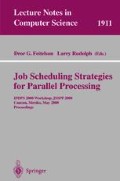Abstract
Over the last decade, much research in the area of scheduling has concentrated on single cluster systems. Less attention has been paid to multicluster systems, although they are gaining more and more importance in practice. We propose a model for scheduling rigid jobs consisting of multiple components in multicluster systems by pure space sharing, based on the Distributed ASCI Supercomputer. Using simulations, we asses the in.uence of the structure and sizes of the jobs on the system’s performance, measured in terms of the average response time and the maximum utilization. We consider three types of requests, total requests, unordered requests and ordered requests, and compare their effect on the system’s performance for two scheduling policies, First Come First Served, and Fit Processors First Served, which allows the scheduler to look further in the queue for jobs that .t. These types of job requests are differentiated by the restrictions they impose on the scheduler and by the form of co-allocation used. The results show that the performance improves with decreasing average job size and when fewer restrictions are imposed on the scheduler.
Access this chapter
Tax calculation will be finalised at checkout
Purchases are for personal use only
Preview
Unable to display preview. Download preview PDF.
References
Aida, K., Kasahara, H., Narita, S.: Job Scheduling Scheme for Pure Space Sharing Among Rigid Jobs. Job Scheduling Strategies for Parallel Processing, Lecture Notes in Computer Science 1459 (1998) 98– 121
Bal, H.E., Plaat, A., Bakker, M.G., Dozy, P., Hofman, R.F.H.: Optimizing Parallel Applications forWide-Area Clusters. Proceedings of the 12th International Parallel Processing Symposium (IPPS’98) (1998) 784– 790
Brecht, T.B.: An Experimental Evaluation of Processor Pool-Based Scheduling for Shared-Memory NUMA multiprocessors. Job Scheduling Strategies for Parallel Processing, Lecture Notes in Computer Science 1291 (1997) 139– 165
Feitelson, D.G., Rudolph, L.: Toward Convergence in Job Schedulers for Parallel Supercomputers. Job Scheduling Strategies for Parallel Processing, Lecture Notes in Computer Science 1162 (1996) 1– 26
Feitelson, D.G., Rudolph, L.: Theory and Practice in Parallel Job Scheduling. Job Scheduling Strategies for Parallel Processing, Lecture Notes in Computer Science 1291 (1997) 1– 34
Feitelson, D.G., Jette, M.A.: Improved Utilization and Responsiveness withGang Scheduling. Job Scheduling Strategies for Parallel Processing, Lecture Notes in Computer Science 1291 (1997) 238– 261
Feitelson, D.G.: Packing Schemes for Gang Scheduling. Job Scheduling Strategies for Parallel Processing, Lecture Notes in Computer Science 1162 (1996) 89– 110
Patton Jones, J., Nitzberg, B.: Scheduling for Parallel Supercomputing: A Historical Perspective of Achievable Utilization. Job Scheduling Strategies for Parallel Processing, Lecture Notes in Computer Science 1659 (1999) 1– 16
Kielmann, T., Hofman, R.F.H., Bal, H.E., Plaat, A., Bhoedjang, R.A.F.: MagPIe: MPI’s Collective Communication Operations for Clustered Wide Area Systems. ACM SIGPLAN Symposium on Principles and Practice of Parallel Programming (PPoPP’99) (1999) 131– 140
Subhlok, J., Gross, T., Suzuoka, T.: Impact of Job Mix on Optimizations for Space Sharing Schedulers. Supercomputing ’96 (1996)
Author information
Authors and Affiliations
Editor information
Editors and Affiliations
Rights and permissions
Copyright information
© 2000 Springer-Verlag Berlin Heidelberg
About this paper
Cite this paper
Bucur, A.I., Epema, D.H. (2000). The Influence of the Structure and Sizes of Jobs on the Performance of Co-allocation. In: Feitelson, D.G., Rudolph, L. (eds) Job Scheduling Strategies for Parallel Processing. JSSPP 2000. Lecture Notes in Computer Science, vol 1911. Springer, Berlin, Heidelberg. https://doi.org/10.1007/3-540-39997-6_10
Download citation
DOI: https://doi.org/10.1007/3-540-39997-6_10
Publisher Name: Springer, Berlin, Heidelberg
Print ISBN: 978-3-540-41120-8
Online ISBN: 978-3-540-39997-1
eBook Packages: Springer Book Archive

